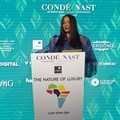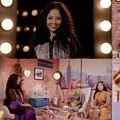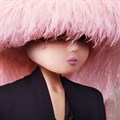As the senior vice president of local and cultural innovation at Estée Lauder Companies, it's Susan Akkad's job to increase the relevancy of the beauty group's brands across global and emerging markets. Overseeing multi-ethnic innovation for brands including La Mer, Clinique, Mac and Estée Lauder, she's no stranger to the concept of (and responsibility of) 'inclusive beauty'.
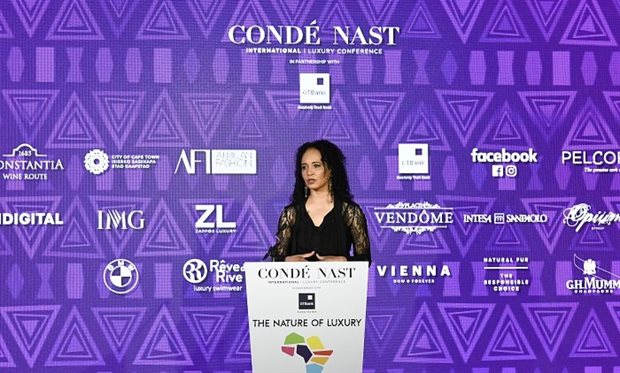
Susan Akkad speaking at the CNI Luxury Conference in Cape Town. Image credit: Heather Shuker
“We have a long-standing and deep commitment to inclusive beauty across ages, regions and cultures because our aspiration really is to be part of every consumer's beauty dream,” Akkad said during her presentation at the Condé Nast International Luxury Conference held in Cape Town in April.
Because Estée Lauder plays exclusively in the prestige or luxury beauty space, it’s this goal of fulfilling “beauty dreams” that acts as a guiding principle for the company, no matter the market.
What’s driving luxury beauty growth in Africa
According to Akkad, the company is predicting a robust increase in prestige skincare and makeup use in Africa and among the African diaspora. This growth, she said, is driven by factors such as the rise of the continent’s middle class, the increase in women's education, their urge to earn a personal income and the improved purchasing power that results from it.
These factors, coupled with rapid urbanisation, deliver an increase in access to higher paying jobs, “and with those types of jobs come very different beauty behaviours and makeup requirements,” she noted.
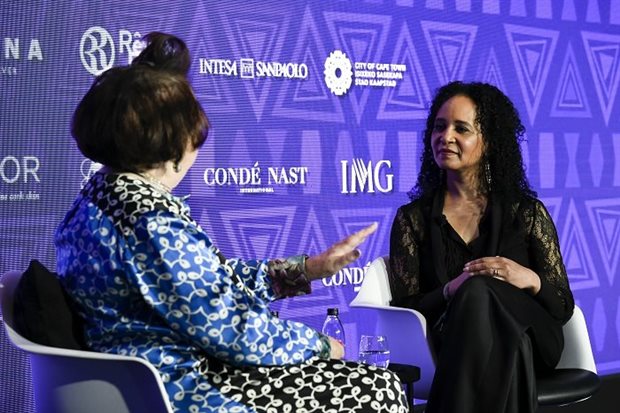
Akkad in conversation with Vogue International editor Suzy Menkes. Image credit: Heather Shuker
Estée Lauder is also keeping a close eye on Africa because it’s the world’s largest youth market. “Young people are more brand conscious and trend driven, and they’re likely to purchase products that reflect the right image. Style makers impact beauty.”
“We're seeing the increasing fluidity of pop culture transfers between Africa and the diaspora. And then globally, there's a huge acceleration in the trend for ‘natural ingredients, which gives the continent a unique role in global sourcing and storytelling,” she added.
Continental complexities
Certainly, doing business in Africa is not without its challenges. With more than 1.2 billion people spread over an enormous land mass, there are dramatic differences in culture, regulations and climate (which impacts beauty). Akkad notes that while the continent has a GDP of $1.5 trillion, there’s individual market volatility and still roughly half the population is living in poverty and in rural areas with limited infrastructure.
Looking at formal retail, she mentioned that in the relatively developed South Africa there are numerous big beautiful malls and many prestige retail partner opportunities. However, in Nigeria, which has one-and-a-half times the spending power of South Africa, there’s 65% less available retail space. And e-commerce in Africa is still underdeveloped in relation to the rest of the world.
Akkad said the most intriguing part of her work is analysing the diversity of consumers.Estée Lauder takes a granular approach to needs and aspirations through an analysis of physical aspects – like skin physiology, skin tone and types, behaviours and barriers – and more abstract and cultural queues like concepts and definitions of beauty, culture and gender identity, norms and codes of behaviours for both beauty and luxury and the way those two things intersect.
“We also look at these within each market, and we also look at them between markets,” she explained.
SA vs Nigerian beauty consumption
Akkad highlighted the nuances between South African and Nigerian beauty consumers. In South Africa, beauty is more about enhancement and pride while in Nigeria it’s about optimisation and status. In South Africa, beauty is more natural and about authenticity versus in Nigeria where it’s more transformational and about perfection.
“There are these similarities and distinct differences across the diaspora. Black America and South Africa have a lot of shared codes whereas Nigeria has a lot of shared beauty codes with Black British,” she continued.
Akkad also said that travel corridors exist where these codes interact and blend. "There's a Lagos-London corridor, there's a Lagos-Dubai corridor. There's a certain status associated with travel In Nigeria.”
Meanwhile, she said Kenyans and South Africans typically travel internally, and if you ask them why they'll often tell you "my country is just too beautiful to leave."
Beauty and influencer marketing
Influencers have had a profound impact on beauty, democratising it in many ways. But Akkad said that for black women across the world, influencers aren’t new.
“Historically black culture has been a word-of-mouth culture reliant on influencers in some way, shape or form, even when we didn't have that word on the tip of our tongues as we have had in recent years. It was a necessity because black people were not well represented in mainstream media."
She credits a lot of the black makeup boom in the United States to the explosion of influencers who have educated consumers about new sub-categories of makeup, new techniques and how to adapt any product or shade to black tones and requirements.
Estée Lauder has used local influencers and its learnings from Africa to launch products elsewhere on the globe, catering to the diaspora and other Afro cultures.
For the Estée Lauder Daywear Matte Moisturiser launch, a product that controls oil and shine, the company was inspired by its internal Africa team who complained about the "12 o clock shine", the oily breakthrough that breaks through make-up by noon. “They had that concern here, but it’s also relevant in other places in the world.”
She adds that Mac, which is present in many markets in Africa, is always developing new shades based on shifts in consumer tones, undertones and preferences within the African continent.
Growing interest in self-care
Linked to aspirations and desire, beauty and cosmetics have a deep significance to consumers across the world. But Akkad says with luxury beauty use, there are higher expectations of both the product benefits and total brand experience.
Outwardly, prestige beauty can reflect one’s current or aspirational economic status, but inwardly, Akkad said it relates to self-improvement and self-care, a concept increasing in popularity as can be seen in the hashtag trend #selfcaresundays, for example.
According to Akkad, in African culture specifically, the relationship with beauty is that of “If I look my best, I'm treated the way I aspire to be and that motivates me to be an even better version of myself.”





































